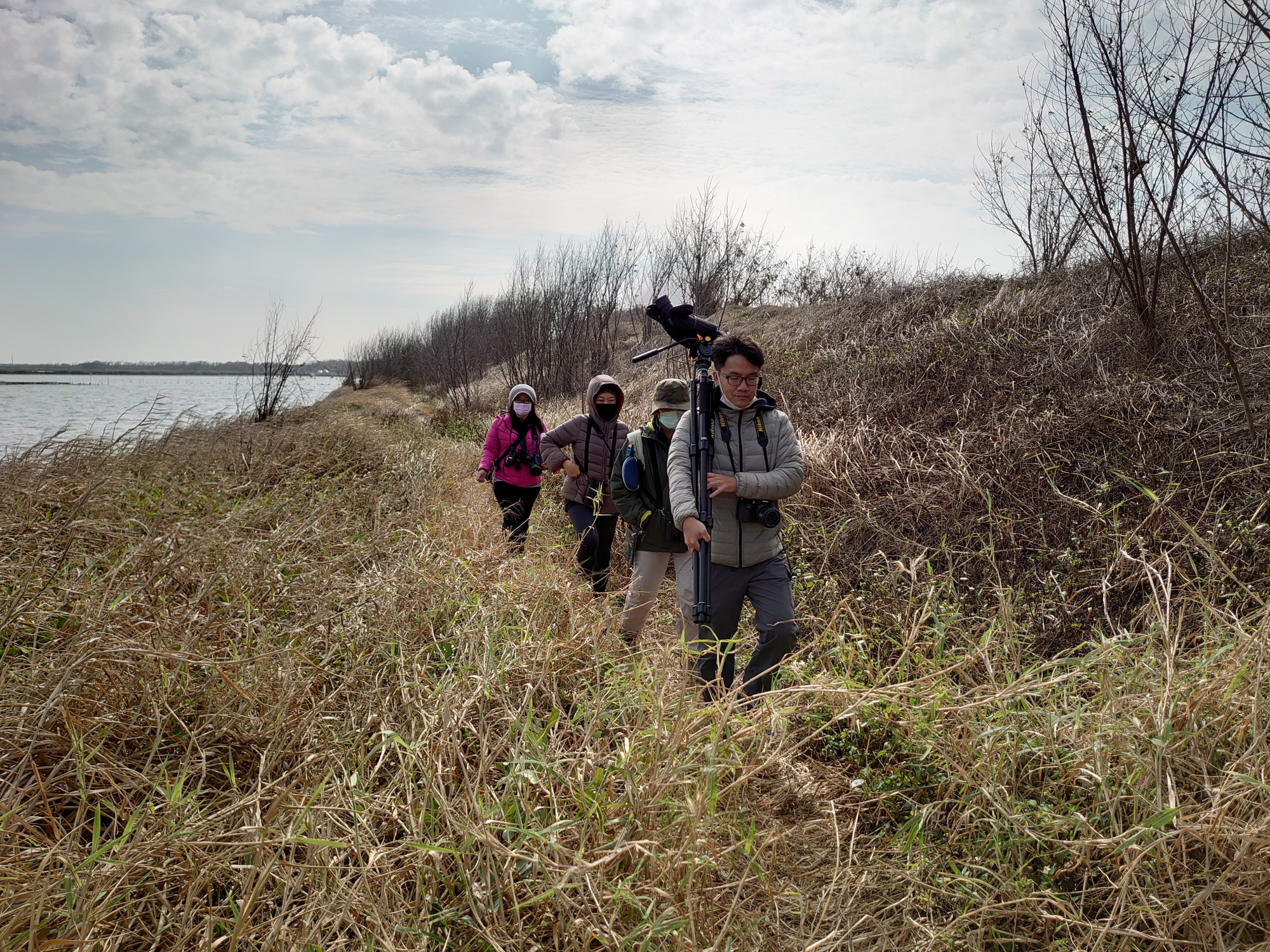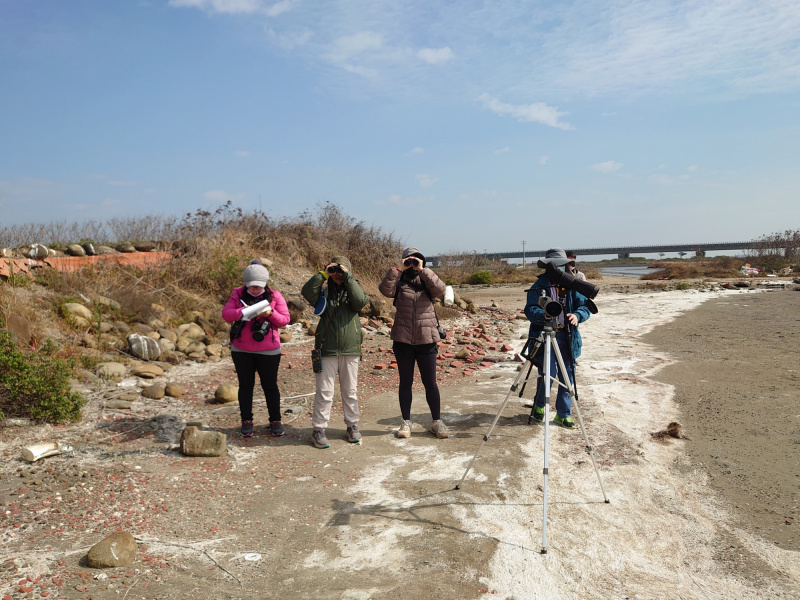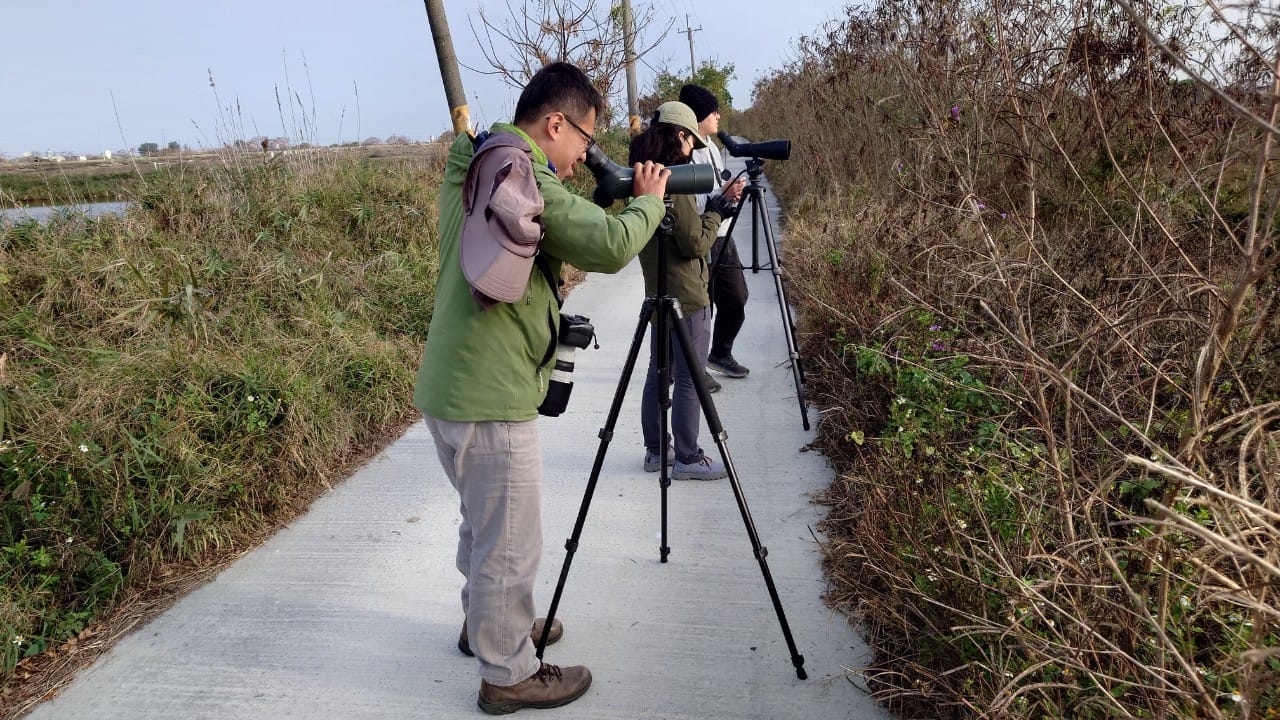Nearly 20,000 Migratory Birds Counted in Tainan's Chiku and Jiangjun Salt Pans!

Representatives of the Chiku and Jiangjun Salt Pan Wetlands Restoration Alliance take part in the Taiwan NYBC (credit: Chuck Hung)
Tainan City's Chiku and Jiangjun salt pan wetlands are vital stopover and wintering sites for migratory birds. Due to the critical importance of these areas, six non-governmental organizations formed the Chiku and Jiangjun Salt Pan Wetlands Restoration Alliance and jointly adopted 1,605 ha of salt pans from Taiwan's National Property Administration in April 2022. On January 7th, 2023, members of the alliance gathered in the adopted land to conduct bird surveys as part of the Taiwan New Year Bird Count, a citizen science driven event which aims to monitor the population and trends of Taiwan's wintering avifauna. Nearly 20,000 individuals from a total of 85 species were recorded, including globally threatened species such as the Black-faced Spoonbill.
During these Taiwan NYBC surveys, the large area was broken up into smaller sections with different teams doing different sample sites. These included the Dingshan salt pans, Qinkunshen Fan-shaped Salt Fields, and the Qingkunshen salt pans. Allen Lyu, secretary-general of the Taiwan Wild Bird Federation, said of the activity: "The Taiwan New Year Bird Count is a citizen science project used to monitor wintering bird numbers in Taiwan. It lasts for four weeks using New Year's Day as a mid-point and annually over 1,000 bird lovers and nature enthusiasts from all over Taiwan form teams to do the count at various sample sites. The data collected is integrated and analyzed by the Taiwan Endemic Species Research Institute. This information is particularly important with regards to migratory waterbirds, many of which are experiencing habitat declines and other threats along their migration paths. Only by understanding the relationship between environmental changes and bird numbers can we propose effective conservation measures."
Lyu continued: "The results from that day were really quite impressive! A total of 30 people participated, recording 19,708 birds from 85 species; mainly migratory waterbirds such as geese, ducks, gulls, sandpipers, plovers, egrets, and herons. Among the largest numbers recorded were 4,172 Northern Pintails, 3,534 Kentish Plovers, 3,132 Dunlins, 1,670 Eurasian Wigeons, and 1,172 Little Egrets. These numbers reflect the fact that this is prime habitat for migratory birds. Should it be destroyed, the implications for these species and their numbers here could be dire."
Natural mudflats around the world continue to shrink and in recent years, many species of sandpiper and plover have declined. Salt pan wetlands provide an important alternative habitat for many threatened migratory birds and need more attention. As an example of this, species recognized as globally threated by the IUCN which were counted that day included: 345 Black-faced Spoonbills (Endangered), 162 Red-necked Stints (Near Threatened), 65 Great Knots (Endangered), 70 Red Knots (Near Threatened), 25 Bar-tailed Godwits (Near Threatened), 6 Saunders's Gulls (Vulnerable) and 3 Black-tailed Godwits (Near Threatened). Pan Chih-yuan, president of the Wild Bird Society of Tainan, said: "International birders specifically arrange visits to Taiwan with this area as one of their destinations because there are so many globally threatened East Asian migratory bird species that can be easily seen here. In addition, while Great Knots, Red Knots and Bar-tailed Godwits are mainly just transiting through in other parts of Taiwan, here they have stable wintering populations. This is one of the most important things about these salt pans."
The Chiku and Jiangjun Salt Pan Wetlands Restoration Alliance is composed of the the Taiwan Wild Bird Federation, the Taiwan Black-faced Spoonbill Conservation Association, the Wild Bird Society of Tainan, Wetlands Taiwan, the Taiwan Environmental & Planning Association and the Society of Wilderness. Zheng Zhong-jie, secretary-general of Wetlands Taiwan, said: "In recent years, Tainan's salt pans have come under enormous pressure from photovoltaic projects. To protect these iconic wetland environments, the alliance adopted a total of 1,605 hectares of state-owned salt pans from the National Property Administration. We will work hard to regularly patrol the area, maintain the environment and monitor the ecology. In the future, we will conduct monthly surveys and cooperate with local communities and schools to jointly promote the most effective use of wetlands as well as environmental education in this area. We hope this beautiful and important land and can be shared with our children and grandchildren."
Issuing Orgainzations: The Taiwan Wild Bird Federation, The Taiwan Black-faced Spoonbill Conservation Association, The Wild Bird Society of Tainan, Wetlands Taiwan, The Taiwan Environmental & Planning Association and The Society of Wilderness




Red Knots flying (credit: Taiwan Wild Bird Federation)
